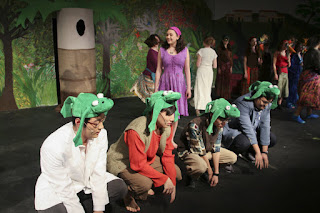Diagram 1:
This first diagram shows a sketch of just the stage with a pattern showing the different areas of the stage.
Diagram 2:
The second diagram shows the stage for one of the songs which I already described in my blog entry. The stage is split in half. Stage right is the setting of Jeff's house in Australia and stage left shows Whangara where Kahu grows up. At the end of the song Rawiri decides to go back to his family. The action on Stage right would show Rawiri’s experience in Australia and on stage left shows Nanny Flowers and Kahu, who is growing up continuously struggling to gain Koro’s attention and affection.
Diagram 3:
Diagram 3 shows the stage but only stage right, where Rawiri is, is light, while Stage left lies in the dark. The lighting will be accordingly whenever Rawiri sings solo and the events concentrate on his actions.
Diagram 4:
Diagram 4 shows the stage but only stage left which shows Whangara, is light, while Stage left lies in the dark. The lighting will be accordingly whenever Nanny Flowers has a solo and the events concentrate on the actions in Whangara.
Diagram 5:
In diagram 5 both sides of the stage are equally light. This will be the case in the refrain when there is singing and action on both sides.
Diagram 6:
Diagram 6 shows both sides of the stage light slightly with a spotlight on each side. These spotlights are for Kahu and Rawiri who will sing a duet solo at the end of the song.
Diagram 7:
I would use the digital projection of waves as a backdrop for the scenes with the whales. In addition I would use blue lighting. The whales I would merely show as big shadows on the digital projection backdrop. There would be one actor who narrates all the scenes that involve just the whales and the Gods.




